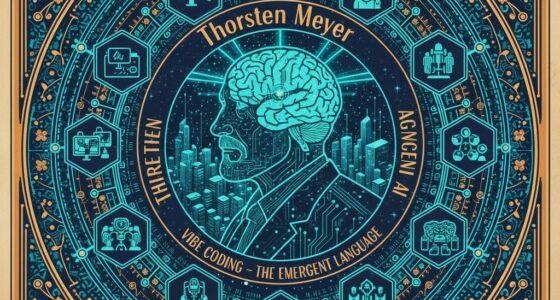Multitasking might seem like a way to get more done, but it secretly damages your focus, memory, and work quality. When you switch tasks frequently, you overload your brain, make more mistakes, and forget important details. It also keeps you from entering deep focus, which hampers creativity and productivity. To improve, try focusing on one task at a time and using tools like Pomodoro or time blocks. Keep going to find out more.
Key Takeaways
- Multitasking overloads the brain, causing mistakes, mental fatigue, and reduced focus.
- Dividing attention prevents deep thinking, hampers creativity, and weakens sustained concentration.
- Switching tasks impairs memory retention, leading to superficial learning and easily forgotten information.
- Multitasking decreases work quality, increases errors, and prolongs task completion times.
- Instead, block dedicated time for single tasks, turn off distractions, and use productivity techniques like Pomodoro.

While multitasking might seem like a way to boost productivity, it often hides significant drawbacks that can undermine your efficiency. One of the main issues is cognitive overload. When you attempt to juggle multiple tasks at once, your brain becomes overwhelmed, forcing it to switch focus rapidly without fully engaging in any one activity. This constant switching taxes your working memory, making it harder to process information effectively. As a result, you may find yourself making more mistakes, forgetting important details, or taking longer to complete tasks. The mental strain from cognitive overload also leaves you feeling exhausted and less capable of sustained concentration.
Diminished focus is another critical consequence of multitasking. Instead of dedicating your attention to one task, you divide it across several, which prevents you from entering a state of deep work. This fragmented attention hampers your ability to think clearly and creatively. When your focus is split, you’re more likely to overlook key aspects of your work or make careless errors. The constant shifting between tasks prevents your brain from settling into a flow state, where productivity and quality peak. Over time, this persistent distraction can weaken your capacity to concentrate on any single task, making it harder to achieve meaningful progress.
Furthermore, multitasking hampers your ability to retain information. Since your brain is not fully committed to one task, the information you gather is less likely to be encoded into long-term memory. This can be especially problematic when you’re learning new skills or trying to remember important details. Instead of gaining mastery or understanding, you end up with superficial knowledge that’s easily forgotten. The illusion of productivity created by multitasking can be misleading, making you feel busy without actually accomplishing much in the way of meaningful work. Research shows that dividing attention can significantly impair learning and retention, reducing overall effectiveness.
To counteract these downsides, it’s best to adopt strategies that prioritize focus. Break your work into dedicated blocks of time where you concentrate solely on one task at a time. Turn off notifications and minimize distractions to help your brain settle into a state of flow. Use tools like to-do lists or time management techniques such as Pomodoro to maintain a structured approach. Over time, these habits will help you improve your cognitive function, reduce mental fatigue, and enhance the quality of your work. By resisting the urge to multitask, you give your brain the opportunity to operate at its best, leading to more effective and satisfying outcomes.
Frequently Asked Questions
Can Multitasking Improve Productivity in Some Situations?
Multitasking can sometimes boost productivity when tasks require minimal divided attention, allowing you to handle simple activities simultaneously. However, it increases cognitive load, making it harder to focus deeply. In those situations, multitasking might seem efficient, but often it leads to mistakes or slower progress. To truly stay productive, prioritize tasks that need your full attention and minimize divided attention to avoid overwhelming your cognitive capacity.
How Does Multitasking Affect Long-Term Memory Retention?
When you multitask, it can harm your long-term memory retention by causing cognitive overload and attention fragmentation. Your brain struggles to process and store information effectively when constantly switching tasks, leading to weaker memories. Instead of multitasking, focus on one activity at a time to improve your ability to retain information long-term. This approach helps your brain encode memories more deeply, enhancing your overall learning and recall.
Are There Specific Tasks Where Multitasking Is Beneficial?
Some tasks benefit from multitasking, especially when they’re simple or routine, like listening to music while cleaning. But for most tasks, you’ll want to prioritize them and focus on one at a time. Practice task prioritization by identifying what’s urgent and important. Single task focus helps you perform better, reduces errors, and improves overall efficiency. Save multitasking for low-stakes activities to stay productive without sacrificing quality.
What Are the Psychological Effects of Constant Multitasking?
When you constantly multitask, you experience cognitive overload and attentional fragmentation. This makes it harder to focus and process information effectively, leading to increased stress and mental fatigue. Over time, your ability to concentrate diminishes, and you may become more prone to mistakes. The psychological effects include decreased productivity, frustration, and a sense of being overwhelmed, which can negatively impact your overall well-being and mental health.
How Can I Train Myself to Avoid Multitasking?
To train yourself to avoid multitasking, start by practicing single task focus. Set clear priorities and dedicate specific time blocks to each task, avoiding interruptions. Use mindful attention to stay present in what you’re doing, which improves focus and efficiency. Gradually, you’ll build the habit of concentrating on one task at a time, reducing errors and stress, and boosting your overall productivity.
Conclusion
Multitasking might feel like juggling flaming torches, but it often leads to dropped balls and frustration. Imagine trying to bake a cake while simultaneously fixing a leaky faucet—you end up with a burnt dessert and a flooded kitchen. Studies show your productivity drops by 40% when you multitask. Instead, focus on one task at a time, like a chef perfecting a single recipe. That way, you’ll enjoy better results and less stress.









